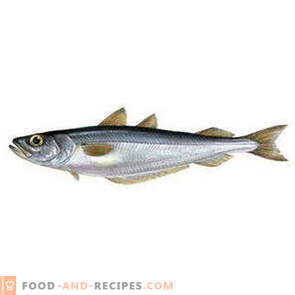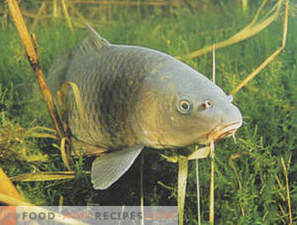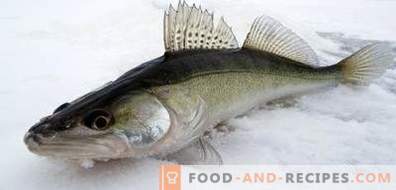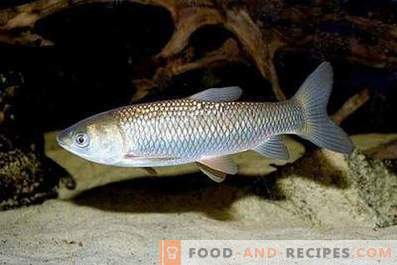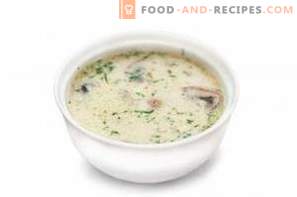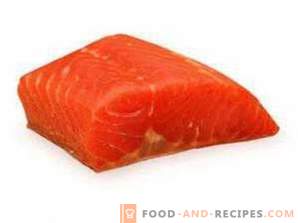
Salmon, or Atlantic salmon, is a valuable and rare fish of the salmon family living in the waters of the Arctic and Atlantic Oceans, in the basins of the Barents, Baltic and White seas, in the Ladoga and Onega lakes. Representatives of this species have an oblong body, covered with fine shiny scales, an elongated and slightly pointed head, a large mouth with a variety of sharp, strong teeth. The sides of the Atlantic salmon are silvery, the back is gray with a bluish tint, the fins are brown. Over the side line on the body of the fish you can find a lot of dark spots.
The maximum lifespan of salmon in nurseries and wild water bodies is 13 years. During this time, Atlantic salmon have time to gain weight up to 39 kg and grow to a length of up to 145 cm. Salmon comes in sale fresh, frozen, salted and smoked. Carcasses and fillets of this fish are baked, boiled, fried, used to make soups, pastries, salads, cold appetizers or main dishes.
Nutritional value of salmon *
- 22, 438 g of proteins;
- 12, 499 g of fat;
- 56, 469 g of water;
- 54, 024 mg of cholesterol;
- 8, 477 g of ash.
Vitamins in salmon composition
- Retinol equivalent (A) - 29, 816 mkg;
- Thiamine (B1) - 0, 149 mg;
- Tocopherol equivalent (E) - 2, 476 mg;
- Riboflavin (B2) - 0, 196 mg;
- Nicotinic acid (PP) - 9, 978 mg.
Calorie content of salmon
Calorie raw salmon - 203, 487 kcal. After culinary and heat treatment, its energy value may change. So, the caloric content of Atlantic salmon is:
- salty - 201, 658 kcal;
- smoked - 199, 116 kcal;
- steamed - 186, 504 kcal;
- boiled - 179, 066 kcal;
- fried - 274, 303 kcal.
The energy value of salmon soup - 66, 002 kcal.
Useful items in salmon
Trace elements in salmon composition:
- 0, 788 mg of iron;
- 3, 394 μg of molybdenum;
- 0.664 mg of zinc;
- 5, 877 μg of nickel;
- 54, 313 μg of chromium;
- 427, 097 μg of fluorine.
Macroelements in salmon:
- 362, 907 mg of potassium;
- 29, 804 mg of magnesium;
- 199, 044 mg of sulfur;
- 208, 964 mg of phosphorus;
- 59, 691 mg of sodium;
- 163, 194 mg of chlorine;
- 9, 404 mg of calcium.
Useful properties of salmon
- Salmon is a source of easily digestible protein that has an optimal amino acid composition.
- Atlantic salmon fillets are rich in vitamin E and other antioxidant compounds. With regular consumption of this fish, the processes associated with aging of the body are slowed down, the skin condition improves, small facial and wrinkles are smoothed, the risk of benign and cancer tumors is reduced.
- Vitamin A, present in Atlantic salmon fillets, improves eyesight, prevents the development of malfunctioning of the visual apparatus.
- Salmon is a rich source of omega-3 fatty acids, magnesium, potassium and other nutrients that strengthen blood vessels and heart muscle, helping to eliminate excess cholesterol from the body, reducing the likelihood of developing heart attacks and other cardiac malfunctions.
- Atlantic salmon fillets contain useful macro- and microelements that have anti-inflammatory effects. Nutritionists and traditional healers advise people who are faced with manifestations of inflammatory diseases of the joints and internal organs to include this fish in the diet menu at least once every 10 days.
- Omega-3 fats and other beneficial compounds found in Atlantic salmon fillets improve blood circulation and prevent blood clots from forming.
- Salmon is rich in substances that alleviate the unpleasant symptoms of psoriasis. Research results show that people who regularly include dishes from this fish in their diet are less likely to experience manifestations of dermatological diseases.
- A daily intake of salmon helps speed up the recovery process of the body after prolonged illness and heavy physical exertion.
- Healthy fats, macro- and micronutrients present in the composition of Atlantic salmon, help reduce the likelihood of developing asthma, reduce the frequency of asthmatic attacks.
- Atlantic salmon contains a whole complex of B vitamins that ensure the normal functioning of the nervous system. Fans of dishes from this fish sleep well, rarely irritated over trifles, do not face frequent mood swings, depressions and neuroses. In addition, they are easier to endure traumatic situations and stresses.
- The Atlantic salmon fillet contains a complex of compounds that activate metabolic processes in the human body.
- Salmon is rich in substances that positively affect the state of the skeletal system and prevent the development of diseases of the musculoskeletal system. According to doctors, regular consumption of Atlantic salmon helps speed up the process of fusion and repair of bones after cracks, fractures and other injuries.
- Useful elements that are present in salmon fillets contribute to the strengthening of immunity. With regular consumption of this fish increases the body's resistance to infectious diseases and colds.
- Substances contained in Atlantic salmon improve brain function, help the body recover from mental work.
- Regular consumption of salmon helps to replenish the supply of useful nutrients in the body, avoiding the development of seasonal beriberi.
Contraindications and harm to salmon
- The absolute contraindication to the consumption of salmon is a food allergy to fish and seafood.
- People suffering from hypertension or renal failure should be excluded from the diet of salted and slightly salted Atlantic salmon.
- Salmon is a product of increased energy value. People suffering from obesity or seeking to lose weight, should include it in the diet in limited quantities.
- Salmon, grown in fish farms, is fed with compound feed, which may contain growth hormones, antibacterial drugs, chemical dyes and other substances dangerous to the human body. When buying Atlantic salmon, it is advisable to give preference to fish caught in wild waters.
- Abuse of dishes from Atlantic salmon can adversely affect the health and general condition of people suffering from cholelithiasis or urolithiasis, an active form of tuberculosis, liver diseases that occur in an acute form, from digestive ulcers and disorders in the thyroid gland.
- Excessive consumption of salmon can trigger the development of diarrhea and other disorders in the digestive system.
* All measures are based on 100 g of product.



